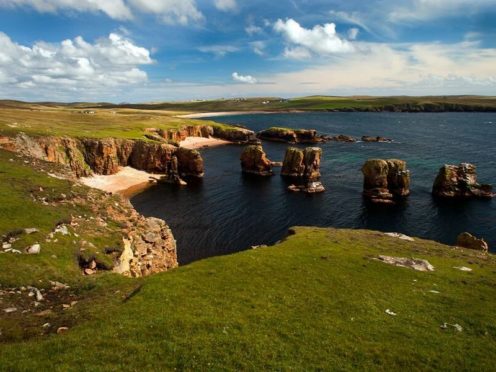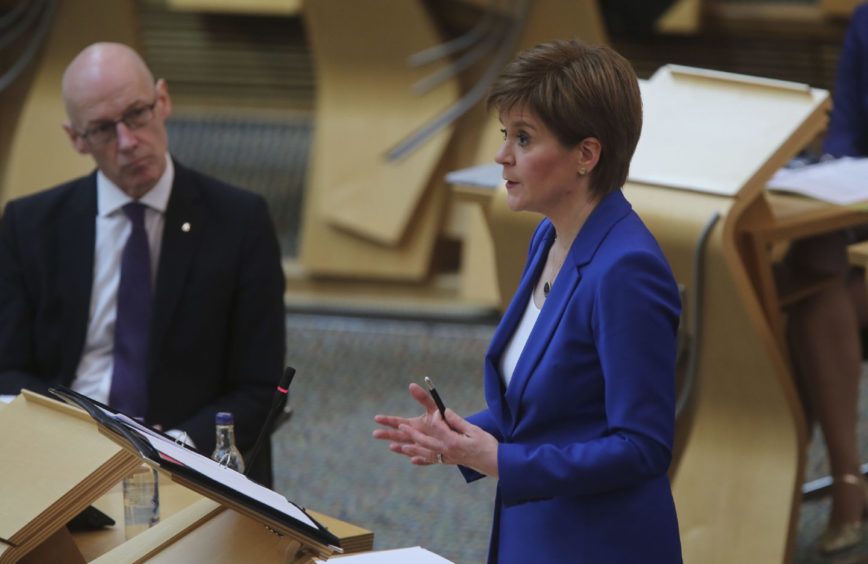Analysis of regional figures has revealed there have been no new confirmed cases of Covid-19 across the island health boards for almost a month.
The data show that it has been 26 days since a confirmed case was reported in Orkney, on April 25, with the last cases reported in Shetland on April 22 and more than a month ago in the Western Isles, on April 10.
It comes as positive national trends allowed the First Minister to set out her road map for the gradual easing of lockdown measures on Thursday, with the country set to move into phase one from next week.
Skye has attracted recent attention following the death of 10 residents from the virus in the Home Farm care home but NHS Highland is the health board that delivers health care on the island.
There has been a total of six confirmed cases of the virus across the Western Isles but no deaths, while Orkney has reported just seven cases.
The figures mark a turnaround for Shetland, which has faced its battles with the virus and was at one point, early on in the outbreak, the worst-affected area of the UK.
On March 21 the island, which has no intensive care facilities and a population of 20,000, had the highest rate of the condition per head of the population of anywhere in the UK.
So it will be considered by some as a victory that the last case was confirmed on the island on April 22, taking the overall total of confirmed cases to 54.
However, Michael Dickson, Chief Executive of NHS Shetland, urged caution, stating the island had already experienced “significant numbers” of cases, adding there are still some circulating in the community.
He said: “This is global pandemic and we cannot become complacent.
“There are still cases circulating in the community and people are doing the right thing by self-isolating but this virus is easily passed on, which is why NHS Shetland stands firmly with NHS Scotland’s guidance, which is stay at home and obey the lockdown.
“We have experienced significant numbers already in Shetland; should people not take this issue seriously and start believing we have beaten the virus we risk the entire situation changing and cases increasing rapidly, putting our loved ones and our NHS at risk.
“The importance of hand washing, social distancing and protecting those who are shielding cannot be overstated.”
There are similar signs the tide could be beginning to turn across the north and north-east, with cases and hospitalisations beginning to decline across the NHS Grampian and NHS Highland health board areas.
Speaking earlier this week, Amanda Croft, chief executive of the health board, said she is “very confident” the health board is prepared and could cope with any future resurgence of the virus in the north-east.
The region has only in recent days started to see a consistent drop in the number of patients hospitalised as a result of the virus and its peak came later than the other health boards in Scotland, with 99 patients hospitalised on May 12.
This has decreased every day since Friday, standing at 72 on Thursday.
Deputy chief executive of NHS Grampian Adam Coldwells said he believes they have “definitely reached a peak” in terms of the numbers admitting to hospital or intensive care with serious symptoms of the life-threatening virus.
The figures show that Grampian peaked on April 19 with 268 confirmed cases, which reduced to 37 as of May 17.
Meanwhile, the figures show that Highland also had a later peak than some health boards with confirmed cases peaking on April 26 at 68.
This was down to 14 last week with three cases reported so far this week.
However, the statistics show there was a sudden surge in confirmed hospitalisations on Wednesday – at 13 people, up from five on Tuesday.
This has reduced from a peak of 49 on April 16.
The latest national statistics from the Scottish Government, released on Thursday, revealed there were 51 people in intensive care across the country, an increase of two since Wednesday.
A total of 37 deaths were recorded over the last 24 hours, bringing the total number of deaths under the Scottish Government’s measurement to 2,221.
Reflecting on the latest figures, the First Minister, in a speech to the Scottish Parliament on Thursday, said the numbers “make clear” the public’s efforts have had an “impact”.
She added: “A mid-range estimate for the number of infected people is 25,000 but we expect that number to decrease further.
“We’re now seeing significant and sustained reductions in the numbers of Covid-19 patients in hospitals.
“The number of Covid-19 patients in intensive care is now less than a quarter of what it was at its peak.
“Yesterday’s data from the National Records of Scotland (NRS) show Covid-19 deaths have now fallen for three consecutive days.
“Last week’s total was just over half the figure that was reported for the last full week in April.”
Ms Sturgeon stressed that the R-number, the average number of people an individual would be expected to infect at a point of time during an epidemic such as the Covid-19 crisis, remains between 0.7 and one.
In March, it was likely to be above four.
She added: “It’s worth saying that although these figures do indicate good progress, we cannot and must not be complacent.
“Progress is fragile and it would be too easy for the virus to run out of control again.
“The total number of Covid-19 deaths last week, 351, is still far too high and although we estimate that the R-number is below one, the range has not changed this week, and there is still uncertainty just how far below one it is.”
However, the First Minister does have “some confidence” the R-number has been below one for three weeks and there has been a reduction in new cases, meaning the time was right for a “careful relaxation” of lockdown restrictions.

